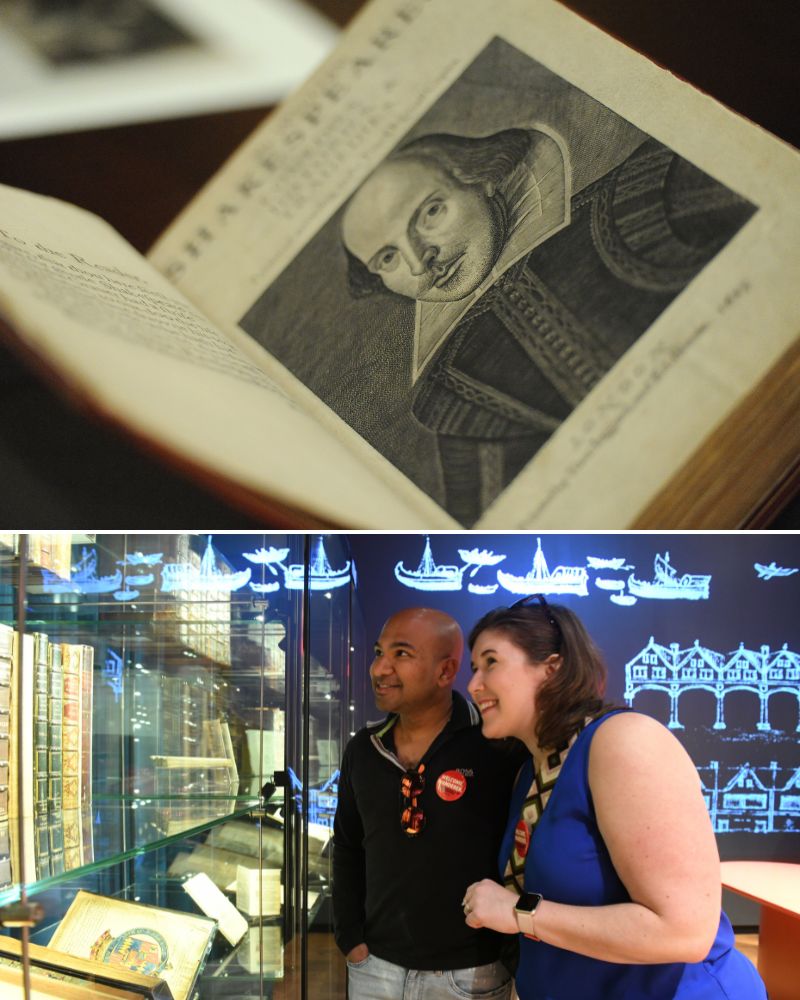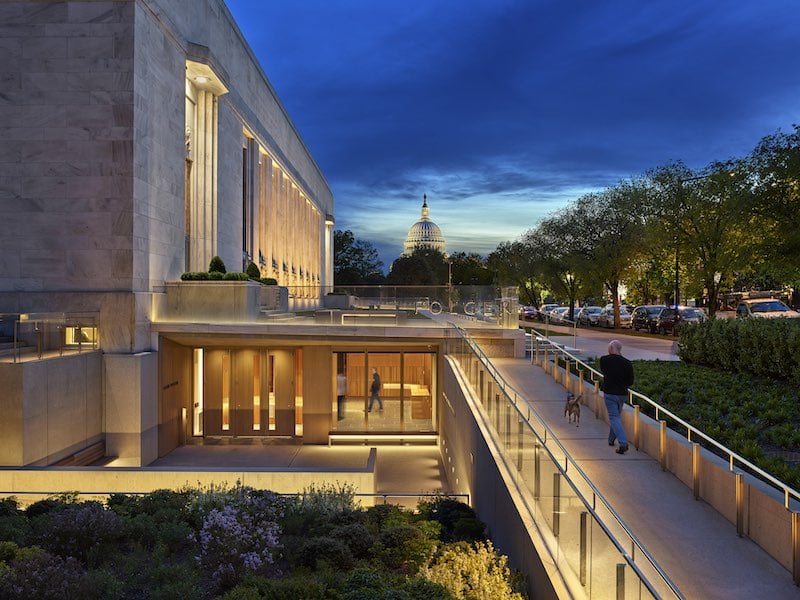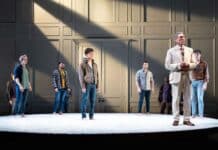The world’s largest Shakespeare library has been reinvigorated. Following a four-year, $80.5-million renovation, the Folger Shakespeare Library in DC’s Capitol Hill neighborhood has unveiled a 12,000-square-foot expansion. The new lower-level gallery makes the Folger a full-day attraction; my recent tour showed an expansion that is dynamically curated, with thought-provoking spaces worth returning to time and time again.
The new exhibits include Shakespeare’s remarkable 82 First Folios, a cornerstone of the Library’s collection. There is also a commissioned artistic piece about Shakespeare’s legacy and how race is portrayed. And for generations young and old, there is a “printing press.”

This was a particularly fun stop when I visited the new space, as while I appreciate Shakespeare’s works, I have never been the best at understanding his language. Yet here you can just “play” with Shakespeare’s words — there is a pile of over 100 of them right in front of you — to set in a line that he wrote (or choose one of your own) to display on screen.
There are countless combinations to humor, compliment, or even insult in the words of the world’s most famous playwright. Theater lovers should make sure to check it out.

The Library’s vision is now guided by Karen Ann Daniels, who joined the Folger in October 2021 as Director of Programming/Artistic Director of Folger Theatre, from New York City’s Public Theater. She has a vision focused on connectivity. “We are driven to build programming that creates natural bridges between the historical items like Shakespeare’s folios and making a visceral, meaningful connection to a modern audience,” Daniels said. “We are also eager for people of all ages and stages of life to think of the Folger as their go-to place to inquire, to learn, and to gather.”
It is meaningful to see the Folger connect with the modern audience; for theater aficionados, in particular, it is fantastic to better appreciate the connection between the Library and its stage. For example, there is space devoted to the recent acclaimed production of Mary Zimmerman’s Metamorphoses, directed by Psalmayene 24 and featuring an all-Black cast, where you can see and understand how the books of Shakespeare were used to inform the show’s development. I have seen Psalm’s dynamic work in multiple DC performing arts spaces; it was exciting to “dork out” and learn how he integrated the Library’s resources into this production.
The Folger, founded and administered by Amherst College, has upped its engagement opportunities inside and outside of its theater. Earlier in 2024, the second iteration of The Reading Room Festival was held: this now annual event allows writers to share work inspired by, or in response to, the plays of Shakespeare.
As a homeowner with a half-hour trek to Capitol Hill, it is also wonderful to see that the Library has increased its engagement opportunities in the broader DC community. Folger artist-in-residence Katherine Harroff recently launched “DC & Me,” which seeks to “gather and uplift community stories” within the District. The installation includes stories from residents of Anacostia, Mount Pleasant, and Penn Quarter, which are now shared within those three neighborhoods’ DC Public Libraries through September 9.

One of the most exciting aspects of the new space, for individuals who wonder why Shakespeare matters in the 21st century, is a new artistic commission by artist Fred Wilson. I consider myself to be part of that group of critics; I found this exhibit (entitled God me such uses send, Not to pick bad from bad, but by bad men [a line from Othello]) to be a riveting look at, in the artist’s words, “the most famous Black Venetian who never lived.” With it at the Folger is also an engraving of Shakespearean actor Ira Aldridge as Othello (who, in 1825, became likely the first Black actor to assume this role) and a gorgeous painting of Elizabeth I. The Wilson pieces provide an encapsulation of race, gender, and power fit for the Folger’s home in Washington, DC; they are an important counterpoint to educate those who may have questioned the relevance of Shakespeare because of the era he wrote in.
As to the future of the Folger, I look forward to coming back and seeing what will come next among the set of exhibits that will rotate regularly. Yet it’s not just the exhibition space in the modern Folger; you can bring your loved one to “Folger Fridays” and your kids to “Folger Family Takeover” (keep them satiated at the Library’s soon-to-open Quill & Crumb café; meanwhile, the delicious milkshakes of Good Stuff Eatery are just a five-minute walk away).
Many people, like me, have only been to the Folger for a play. They have never been to its Great Hall, never seen the stunning Reading Room, and never had the chance to explore what the Library has to offer. This new expansion, coupled with diverse programming on Capitol Hill and in the community, evokes an important 21st-century chapter for this DC arts institution.

The Folger Shakespeare Library is located at 201 East Capitol Street SE, Washington, DC. Regular operating hours are:
Monday: closed
Tuesday: 11 am–6 pm
Wednesday: 11 am–6 pm
Thursday: 11 am–9 pm
Friday: 11 am–9 pm
Saturday: 11 am–9 pm
Sunday: 11 am–6 pm
Hours may be extended Sunday, Tuesday, and Wednesday if performances are scheduled in the theater. The Reading Room has its own hours of operation.
Tours will be offered at noon and 4pm Sunday–Wednesday, with an additional tour offered Thursday–Saturday at 7pm.
Find visitor information here. The Folger recommends timed-entry passes to ensure entry into the Folger’s new exhibition halls at the time of you choosing. Passes may be booked up to three months in advance. Admission to the Folger is free, though a donation of $15 per person is suggested to support operating costs.
SEE ALSO:
Folger Shakespeare Library to open new galleries, café, and shop (news story, February 1, 2024)



